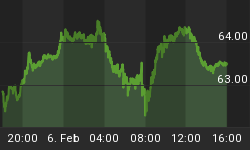May we suggest a Twitter version of today's FOMC statement: "Don't worry, be happy! " - No, the economic outlook hasn't improved. In fact, the Fed may want you to take a vallium to stomach the ride ahead. Alternatively, if you don't get mollified by the Fed's "communication strategy", you may want to consider taking action to protect the purchasing power of your hard earned dollars.

Here's the challenge: the Federal Reserve (Fed) wants to keep interest rates low across the yield curve (from short-term to long-term rates) to aid the economic recovery. But good economic data might send the bond market into a tailspin, i.e. raise long-term rates and thus cause massive headwinds to the economic recovery. We got a taste of how quickly the bond market can sell off earlier this year when the economy appeared to pick up some steam. Higher interest rates would further encourage the major deleveraging that market forces still warrant, not a desirable scenario from our understanding of Fed Chairman Bernanke's thinking.
Engaging in further rounds of asset purchases ("Quantitative Easing", "QE3", "QEn+1") may alleviate some of those upward pressures on interest rates, but the moment a program is announced, the market prices it in and looks ahead, threatening to mitigate any lasting impact of QEn+1. Picture the Fed as trying to hold a carrot in front of the donkey, well, market, to make us believe another stimulus is coming, without actually giving it. That way, the Fed can print less money to achieve its goals. The Fed calls it communication strategy.
Some have suggested a more open-ended approach to asset purchases. But that would likely come with some sort of guidance as to when to stop it, such as when a certain level of unemployment or nominal growth is reached. Given that everything Bernanke has done has been signaled well ahead of time (the blogosphere is full of the "best kept secret", the likelihood of more QE), introducing a completely new concept is rather un-Bernanke-ish. You may not agree with Bernanke, but as an investor please don't act surprised.
Read past Merk Insights
In recently released FOMC minutes, the Fed tells us that it might communicate to the market that rates may remain low even as the economy recovers. Bingo! We have long argued that Bernanke considered the early monetary tightening during the Great Depression as a grave mistake, as it undid all the "progress" that had been achieved. But more to the point, the Fed needs to get our attention away from the economy. By keeping the link to the economy, the Fed will always struggle to keep the upper hand on the bond market. So forget about the carrot: we need vallium, not carrots. By communicating with the market that rates will remain low independent of how the economy might perform, the bond market just might not be selling off as aggressively as economic growth picks up.
That's exactly the path we believe the Fed is going to go down. It will be interesting, however, to see what the Fed's explanation will be. We doubt they will use the vallium analogy. Some Fed watchers would like to see a nominal GDP target or something similar, but don't bet your donkey on Bernanke going that far.
The basic challenge is - and we are interpreting here as we don't think the Fed or any central banker in office would ever frame it this way: the Fed wants to have inflation, wants to move the price level higher to bail out home owners, wants to push up nominal wages, and wants to push up nominal GDP to make the debt burden more bearable. But the Fed doesn't want the market to price in inflation, as that would push interest rates up. That's why we may be heading ever more into the "Land of Make-Believe." But as investors enjoy their vallium, the U.S. dollar is at risk of melting away under their feet. Drugged up, we are too busy laughing at Greece and doling out advice to Europe to notice that our "don't worry, be happy" approach might lead to rather unhappy purchasing power. If you think you are above the fray, let me just ask whether you have watched the euro in recent months? As of late, that perceived weakling of a currency appears to be giving the greenback a run for its money. We are not suggesting that investors dump their U.S. dollars and exchange them all for euros. However, we would like to encourage investors to consider embracing currency risk, for example through a managed basket of currencies, as a way to manage the risk posed to the purchasing power of the U.S. dollar. Adding currency exposure to a portfolio may have valuable diversification benefits.
Some sympathize with the ever greater complexity of monetary activism around the world. But it's really rather simple: there's too much debt in the world. To deal with the debt, countries may deflate, default or inflate. In the US, we have what both Bernanke and his predecessor Greenspan have called the printing press; as such, so their argument goes, the U.S. dollar is safe - in nominal terms at least. Greece is not capable of procuring vallium, which creates a different set of challenges. But stop pitying Greece and consider taking action to protect your purchasing power at home.
Please sign up to our newsletter to be informed as we discuss global dynamics and their impact on gold and currencies.
You can also engage with me directly at Twitter.com/AxelMerk where I provide real-time updates on the economy, currencies, and global dynamics.















